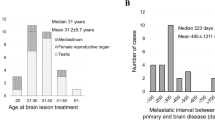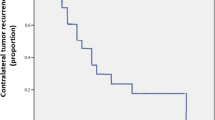Abstract
Background
Brain metastases of testicular germ cell tumor (TGCT) are a rare event. Prognostic is poor and there is not much evidence on optimal management of these patients.
Patients and methods
A review of case records of germ cell tumor patients within the Spanish Germ Cell Cancer Group data base from 1994 to 2012 was conducted.
Results
Thirty-three out of 6,200 cases (0.5 %). Nineteen patients (57 %) group 1: synchronous, 13 (40 %) group 2: metachronous and only one developed brain metastasis during cisplatin-based chemotherapy (excluded from the analysis). Median serum BHCG levels at initial diagnosis was higher in group 1, whereas elevated AFP serum levels were more common in group 2. Histology in the primary tumor: chorionic carcinoma for group 1 versus embryonal carcinoma for group 2. Mainly solitary brain metastasis in group 2 (54 versus 21 %, respectively). The median overall survival from the diagnosis of central nervous system involvement was 16 months for group 1 (CI 95 % 13.9–18) and 23 months (95 % CI 0–165) for group 2 (log rank p = 0.84). Long-term survivors were practically identical in the two groups (38.9 % group 1 versus 38.5 % group 2). Regardless of the timing of brain metastasis, those patients that achieved complete response to the treatment had better survival (log rank p 0.003).
Conclusion
Although some distinctive clinical characteristics have been found between patients with synchronous versus metachronous brain metastasis from TGCT, the timing of brain metastasis did not seem to have prognostic influence, but due to the retrospective nature of the analysis and the results should be interpreted with caution.





Similar content being viewed by others
References
Raj S, Parkinson C, Williams M, Mazhar D. Management of brain metastases from germ cell tumors: do we know what we are doing? Future Oncol. 2008;4(1):1–4.
Fossa SD, Bokemeyer C, Gerl A, Culine S, Jones WG, Mead GM, et al. Treatment outcome of patients with brain metastases from malignant germ cell tumors. Cancer. 1999;85(4):988–97.
Bokemeyer C, Nowak P, Haupt A, Metzner B, Köhne H, Hartmann JT, et al. Treatment of brain metastases in patients with testicular cancer. J Clin Oncol. 1997;15(4):1449–54.
International Germ Cell Cancer Collaborative Group. International germ cell consensus classification: a prognostic factor-based staging system for metastatic germ cell cancers. J Clin Oncol. 1997;15(2):594–603.
International Prognostic Factors Study Group, Lorch A, Beyer J, Bascoul-Mollevi C, Kramar A, Einhorn LH, Necchi A, et al. Prognostic factors in patients with metastatic germ cell tumors who experienced treatment failure with cisplatin-based first-line chemotherapy. J Clin Oncol. 2010;28(33):4906–11.
Rustin JS, Newlands S, Begent RH, Dent J, Bagshawe KD. Weekly alternating etoposide, methotrexate and actinomycin/vincristine and cyclophosphamide chemotherapy for the treatment of CNS metastases of choriocarcinoma. J Clin Oncol. 1989;7:900–3.
Gerl A, Clemm Ch, Kohl P, Schalhorn A, Wilmanns W. Central nervous system as sanctuary site of relapse in patients treated with chemotherapy for metastatic testicular cancer. Clin Expert Metastasis. 1994;12:226–30.
Germà-Lluch JR, García del Muro X, Tabernero JM, Sánchez M, Aparicio J, Alba E, et al. BOMP/EPI intensive alternating chemotherapy for IGCCC poor-prognosis germ-cell tumors: The Spanish Germ-Cell Cancer Group experience (GG). Ann Oncol. 1999;10:289–93.
Lester SG, Morphis JG 2nd, Hornback NB, Williams SD, Einhorn LH. Brain metastases and testicular tumors: need for aggressive therapy. J Clin Oncol. 1984;2:1397–403.
Nonomura N, Nagahara A, Oka D, Mukai M, Nakai Y, Nakayama M, et al. Brain metastases from testicular germ cell tumors: a retrospective analysis. Int J Urol. 2009;16:887–93.
Stolinsky DC. Prolonged survival after cerebral metastasis of testicular carcinoma. Cancer. 1981;47:978–81.
Williams SD, Einhorn LH. Brain metastases in disseminated germinal neoplasms, incidence and clinical course. Cancer. 1979;44:1514–6.
Spears T, Morphis G 2nd, Lester G, Williams SD, Einhorn LH. Brain metastases and testicular tumors: long-term survival. Int J Radiat Oncol Biol Phys. 1991;32:17–22.
Conflict of interest
The authors declare no conflict of interest.
Author information
Authors and Affiliations
Consortia
Corresponding author
Rights and permissions
About this article
Cite this article
Girones, R., Aparicio, J., Roure, P. et al. Synchronous versus metachronous brain metastasis from testicular germ cell tumors (TGCT): an analysis from the Spanish Germ Cell Cancer Group data base. Clin Transl Oncol 16, 959–965 (2014). https://doi.org/10.1007/s12094-014-1179-5
Received:
Accepted:
Published:
Issue Date:
DOI: https://doi.org/10.1007/s12094-014-1179-5




